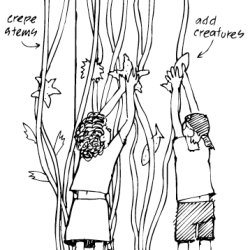Source Institutions
Source Institutions
Add to list Go to activity
Activity link broken? See if it's at the internet archive

This marine biology activity (on pages 11-17) introduces learners to kelp (seaweed) forests that grow in the ocean and are home to many species of sea animals. Learners construct a forest make of crepe paper, and populate it with drawings of kelp forest creatures such as sea stars, otters, and crabs. Learners determine where to place their animal drawings based on information provided in the activity about where different kelp animals live in the underwater forest. This activity could be used for an ocean themed unit.
- 10 to 30 minutes
- 1 to 2 hours
- $1 - $5 per group of students
- Ages 8 - 14
- Activity, Model
- English, Spanish
Quick Guide
Materials List (per group of students)
- Beachcomber’s Guide or pictures of kelp forest animals from Web
- space for the kelp forest: a corner of room or floor-to-ceiling wall with 1-meter area in front
- 1 package of different shades of green crepe paper (flat sheets )
- white construction paper
- markers or colored pencils and crayons
- tape
- stapler
- scissors
- rocks (10-12 cm. in diameter, 2 for each participant)
Subjects
-
Earth and Space Science
-
Earth Structure
- Oceans and Water
-
Earth Structure
-
Life Sciences
-
Diversity of Life
- Plants
- Animals
- Ecology
-
Diversity of Life
Informal Categories
- Animals
- Arts and Crafts
- Nature and Environment
Audience
To use this activity, learners need to:
- see
- touch
Learning styles supported:
- Involves teamwork and communication skills
- Involves hands-on or lab activities
Other
Foreign language versions of this resource:
Components that are part of this resource:
Includes alignment to state and/or national standards:
This resource is part of:
Access Rights:
- Free access
By:
Source Collection
- Science After School Consumer's Guide
Rights:
- All rights reserved, University of Nebraska State Museum and Nebraska 4-H, 2001
Funding Sources:
- National Science Foundation Informal Science Education Program, 9909496
- Howard Hughes Medical Institute
